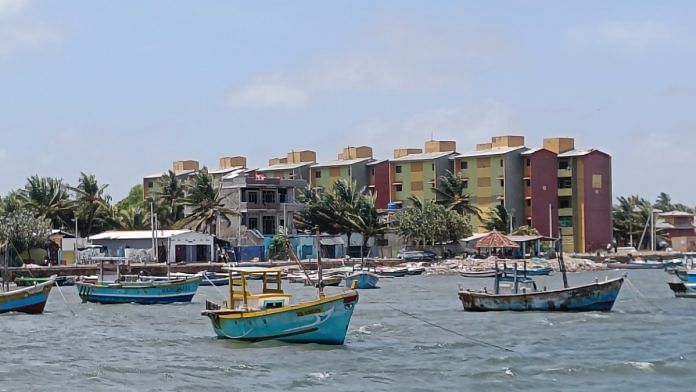Jaffna: Staring out at the sea, fishermen standing on the shore of Sri Lanka’s Palaly North describe the arrival of trawlers from Tamil Nadu as resembling a “kovil thiruvizha” (temple festival).
The men of this small fishing town, 30 minutes from Jaffna, talk about hundreds of boats with bright lights, showing up past 8 pm to ‘bottom trawl’ every species of fish on their way, causing environmental damage and loss of income.
“Even if we are not given assistance to tide over the economic crisis, it is okay. If Indian trawlers are stopped from entering our waters, we will be able to earn a decent living,” said M. Dinesh, president of the Palaly North fisheries cooperative society.
Fleets of trawlers from Tamil Nadu begin their work at Kankesanthurai or KKS and head to Mullaitivu, both 60 kms apart, said Nagarasa Dharmakulasingam, leader of the fisheries cooperative society union in the neighbouring village. “Two months ago, they (Indian trawlers) were barely a kilometre from the shore,” he added.
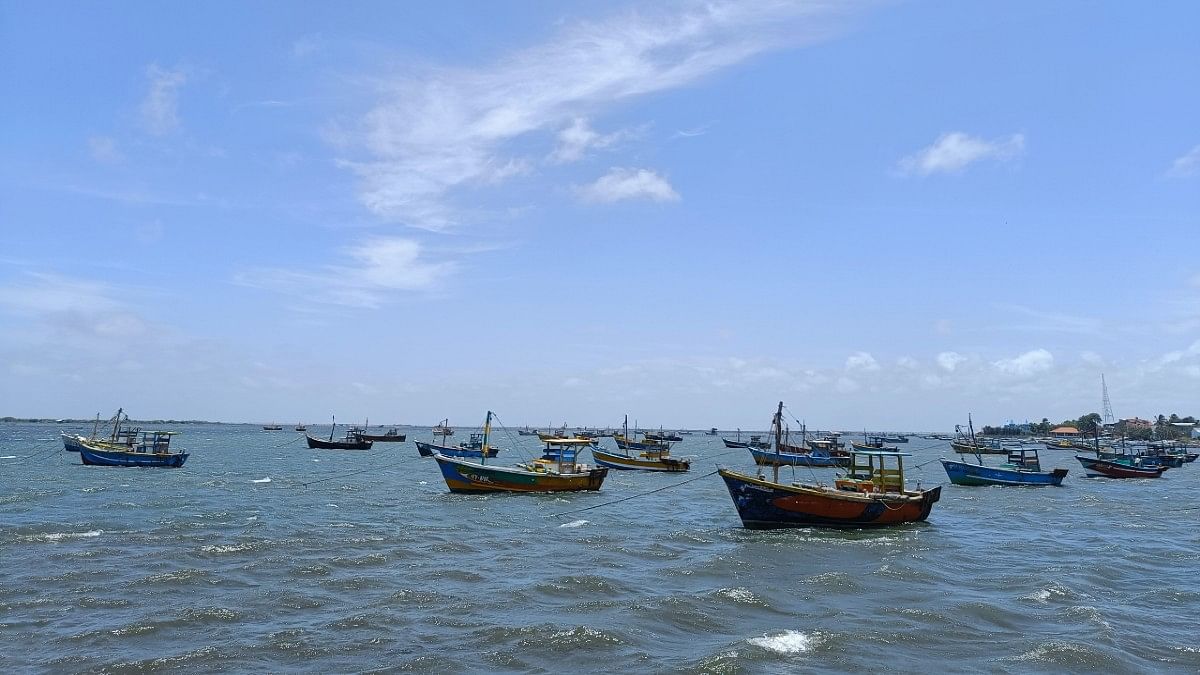
In fishing hamlets in Sri Lanka’s Northern provinces, especially those adjoining the Palk Strait, soaring tensions with Indian fishermen is enmeshed with the economic crisis. In some respects, it is an even larger preoccupation.
But things have been quiet for a few weeks – fishermen in Tamil Nadu take a break from April 15 to June 15 to allow fish to spawn. Even so, Lankan fishermen are worried about how things will play out when their Indian counterparts are back at sea.
Also Read: Sri Lanka falls into default for the first time ever
‘Our protest not against people of Tamil Nadu’
“They are also Tamils; we are also Tamils. We will end up fighting it out and all that the governments will do is stand by and watch,” said Dinesh, adding, “Our protest is against illegal fishing and not against Tamil Nadu’s people or its government.”
Annalingam Annarasa, president of the Jaffna District Fisheries Union Federation, shares Dinesh’s views. “From 2004 to 2016, we have compromised on many things to bring change, but no change has happened. This has to be resolved at a political level. Especially through the intervention of the Tamil Nadu Chief Minister Stalin. We are hoping to meet him soon to discuss a solution.”
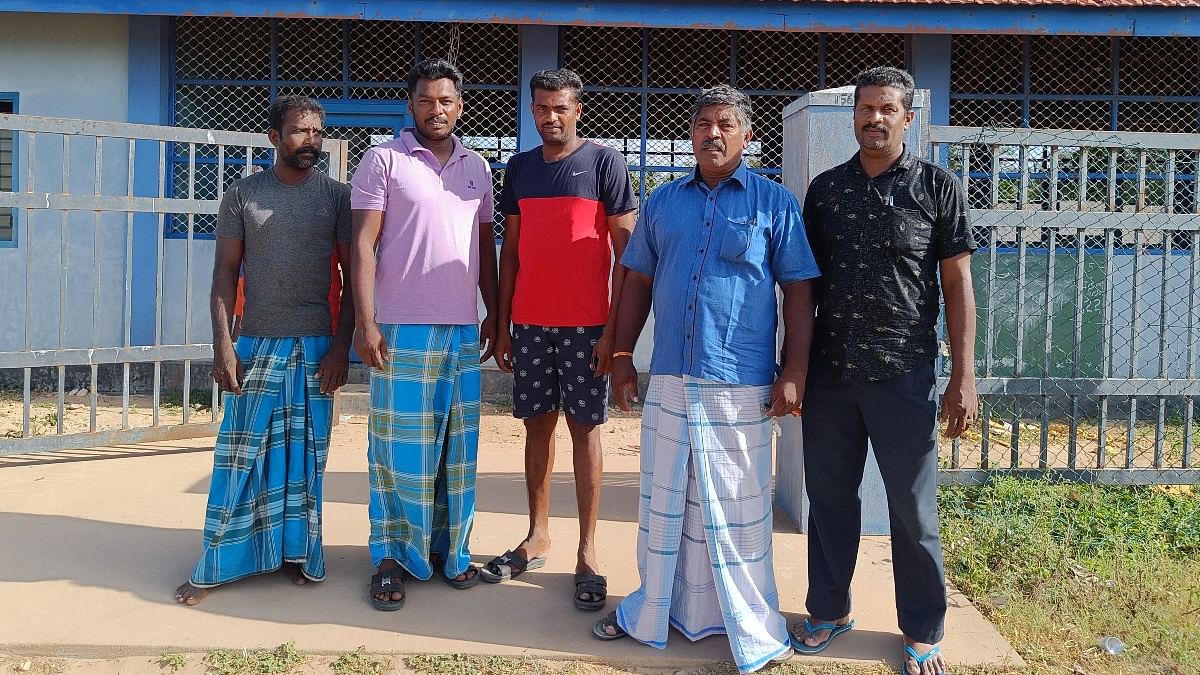
Annarasa described the latest informal dialogue held between both sides on 11 March on the sidelines of the annual church festival at St. Anthony’s Church in Kachchatheevu, an island that shares maritime boundaries with both India and Sri Lanka.
“There were over 20 fishing collective leaders from the Indian side, and 10 of us from Sri Lanka and the meeting went on for three hours. There were two main issues: bottom trawling should entirely stop and both countries’ governments should work out a schedule so fishermen from both sides can go out to sea to earn a living,” he said.
The Sri Lankan fishermen even requested the Indian fishermen to pass on a letter to Tamil Nadu CM M.K. Stalin, but they are yet to receive a reply, Annarasa told ThePrint.
Chennai-based V. Vivekanandan, convener of the Alliance for Release of Innocent Fishermen (ARIF), told ThePrint that it was decided after years of negotiations that the Tamil Nadu government will provide Rameswaram’s fishermen with alternatives for deep-sea fishing further in the Indian Ocean.
“This was seen as a solution to stop them from going to Sri Lanka. The scheme is still in its early stages, and it doesn’t look very promising. Until they go back to the drawing board and come up with better alternatives, it is the Sri Lankan fishermen who will suffer,” he said.
Over the years, efforts such as these have not led to a resolution owing to three reasons: fluid bilateral ties between the two neighbours, the decades-long civil war in Sri Lanka plunging the fisheries industry into neglect and Tamil Nadu fishermen’s assertion of a ‘historical right’ to earn their livelihood through fishing in the bay connecting the two countries.
Disparity, Debt & Death
Fishing remains a primitive profession in Sri Lanka’s Northern provinces due to lack of political will to help fishermen acquire new boats or employ latest technologies to navigate the high seas.
In Palaly, for instance, fishermen use smaller boats that run on kerosene – that has been in short supply due to the ongoing fuel crisis – and say they feel intimidated by the bigger fleets operated by their Indian counterparts. The fuel crisis has rendered at least three-fourths of the fishing boats in Palaly out of action, and those that make it out are at risk of losing fishing nets that snap when entangled with Indian trawlers.
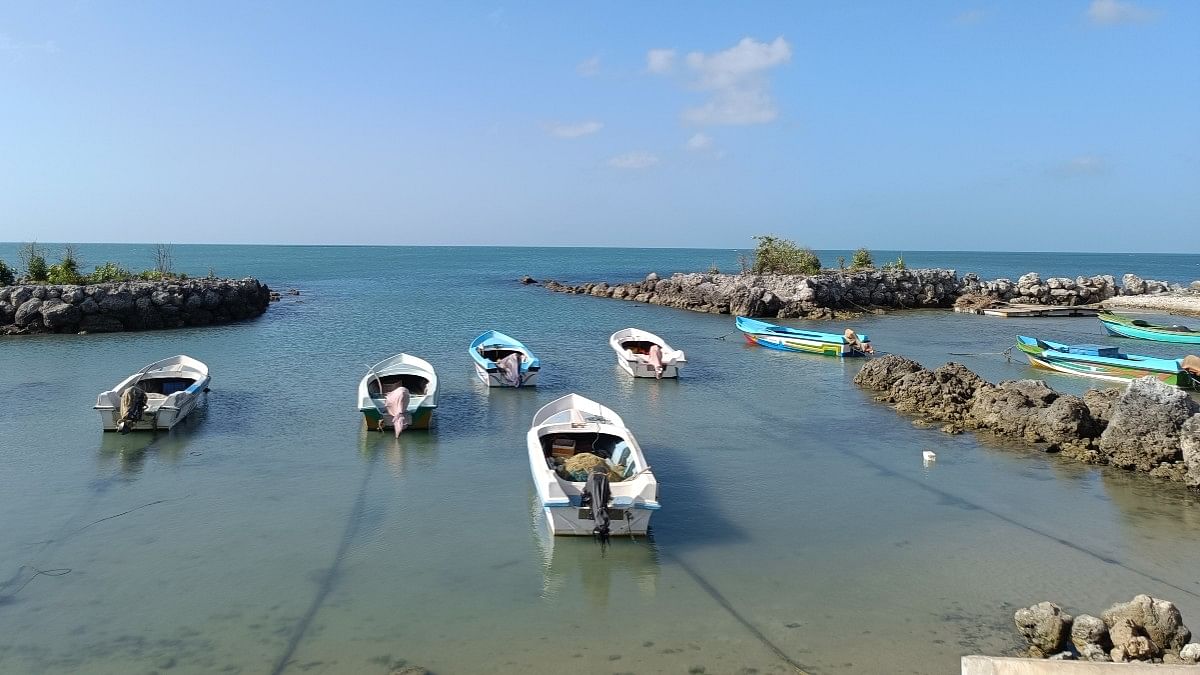
“Previously, a group of us would go out and surround a trawler boat but nowadays we are scared for our lives. There is a huge difference in the size and weight of our boats compared to theirs. When we work late at night, there is a genuine fear over whether we’d return home alive,” said M. Dinesh, adding that many fishermen are forced to borrow from private moneylenders at exorbitant interest rates to sustain their operations.
In February, protests had broken out in Palaly and Valalai over the death of two fishermen in a collision with an Indian vessel. Blocking the roads with their fishing boats, locals demanded action against the Tamil Nadu fishermen resulting in the arrest of 21 Indian fishermen and seizure of two trawlers by Sri Lankan authorities.
Down the road from Palaly North, a dozen captured Indian trawler boats float in the Myliddy fisheries harbour.
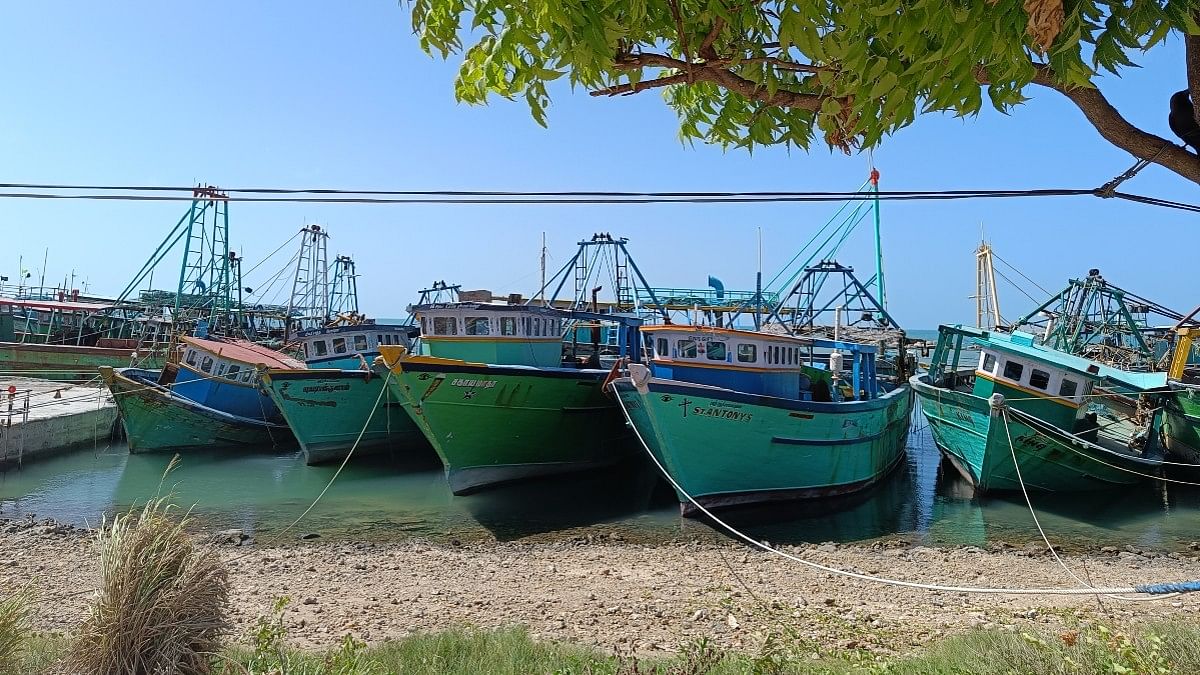
“Most often, people arrested from the Indian boats are labourers and not owners. If the owner shows up to Sri Lanka with the paperwork and engages a lawyer to fight the case, he may be able to reclaim his boat. Otherwise, the boats end up in a legal tangle for years after which they are auctioned off,” said Annarasa.
In the coastal village of Gurunagar in Jaffna, J. Dennis won the auction for the green trawler boat that was seized from Indian fishermen. His winning bid was LKR 1,08,000 (1 Indian rupee = 4.57 Sri Lankan Rupee), and it allows him access to a boat that will allow him to stay out at sea for a week instead of having to return in a day.
The fuel crisis has pushed many out of work in this village. Some can be seen gossiping, others playing games on their phones, while some keep themselves busy by untangling large fishing nets. “There is no electricity at home, so we sit out here since the breeze is good,” said a fisherman who did not wish to be named.
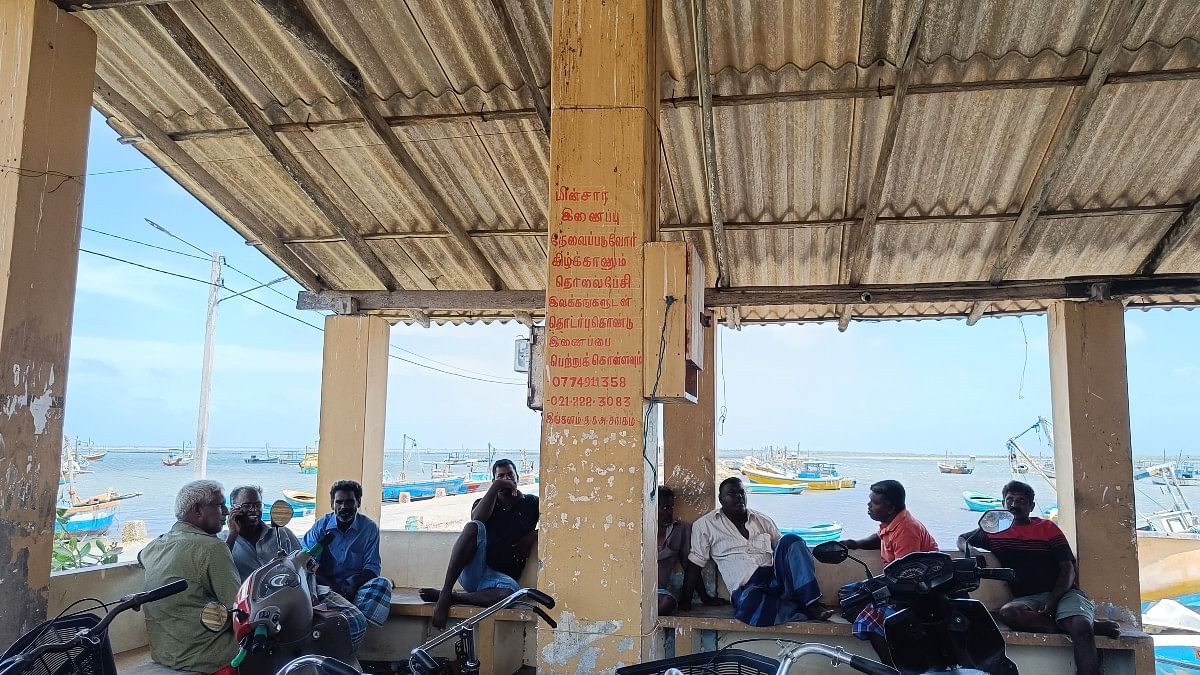
Many in these coastal villages also talk about Chinese support for a sea cucumber hatchery and food processing factory, apart from fishing gear worth LKR 6 million that China handed over to Lankan fishermen.
“If India doesn’t help resolve this dispute with Indian fishermen, we will ask the
Chinese to help,” fishermen in Jaffna said jokingly, referring to the Chinese
ambassador’s visit to the Northern provinces in December 2021.
Fallout of fuel crisis
Fishing communities in the Northern provinces have faced many difficulties since the Sri Lankan civil war ended in 2009 and the economic crisis is only adding to their woes, said J. Yardsan Figurado, director of the Mannar Social and Economic Development Organisation.
“We are slammed by two sets of issues: domestic and international. There is a huge disparity between southern and northern (provinces) in the development of the fisheries industry,” he said.
“In this entire belt of Mullaitivu, Kilinochchi, Mannar or Yalpanam (Jaffna), there are no multi-boat facilities, larger boats which allow fishermen to go out to sea for days. There are no universities or research centres to invest in teaching new skills, nothing,” Figurado adds.
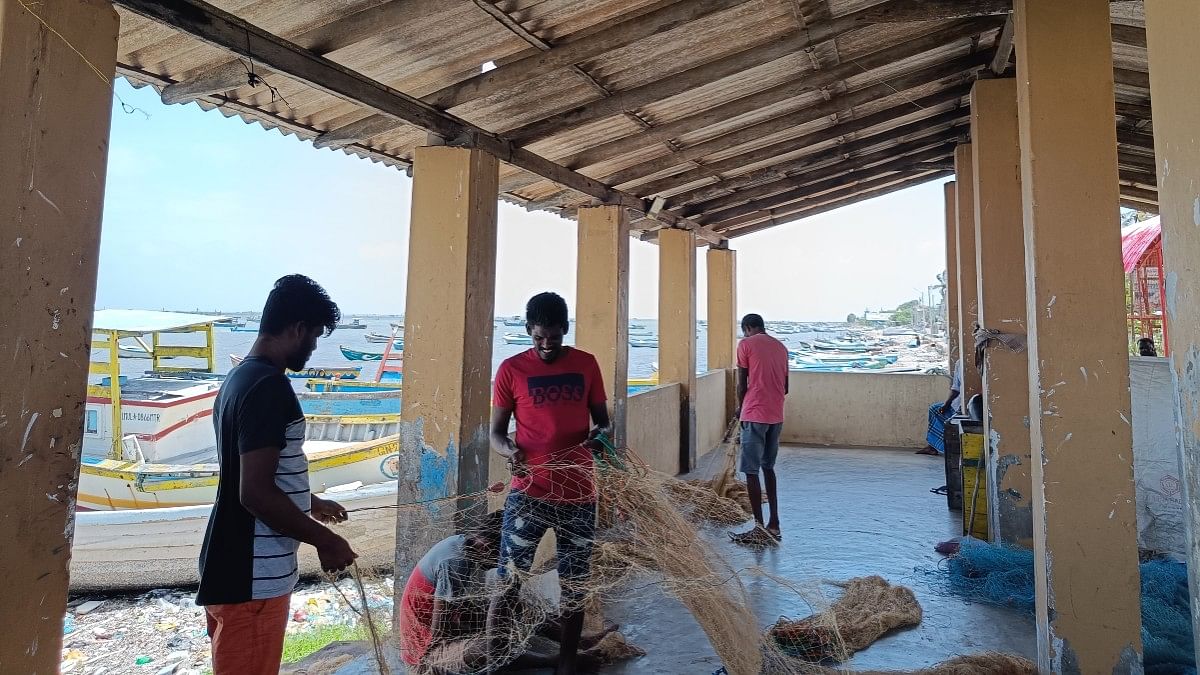
The long queues of people waiting for fuel have caught up with Jaffna too. “Even a week ago, the lines outside fuel stations weren’t this long in the North,” Annarasa told ThePrint.
“We noticed that after Ranil (Wickremesinghe) took over as Prime Minister, he has shipped the problem North by curbing allotments. He has to look after the Sinhala people first,” he added.
Annarasa says the basic expenses of his family of four have jumped from LKR 15,000 to 45,000 in the last month. Rice, which used to be LKR 90/kg, is now LKR 260-300/kg; white flour was LKR 87/kg and is now LKR 300/kg; coconut oil now costs LKR 900 per litre from the earlier LKR 280 per litre.
“Initially, we were skeptical of the protests in Colombo. But now, it has stretched into the 42nd day, we are starting to mobilise people here to consider joining the protests,” said Annarasa.
(Edited by Amrtansh Arora)
Also Read: In Sri Lanka, you can treat yourself to spaghetti and meatballs, if you can afford them


